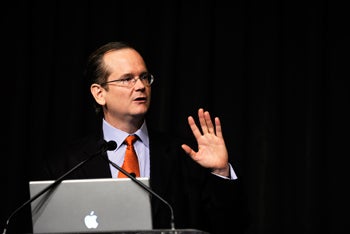Renowned legal scholar Lawrence Lessig has been appointed to the faculty of Harvard Law School, and as the faculty director of Harvard University’s Edmond J. Safra Foundation Center for Ethics.
The announcement was made jointly today (Dec. 12) by Harvard University Provost Steven E. Hyman and Harvard Law School Dean Elena Kagan.
Lessig — a widely acclaimed expert in constitutional law, cyberlaw, and intellectual property — comes to Harvard from the faculty of Stanford Law School. Prior to joining the Stanford faculty in 2000, he was on the faculty of the University of Chicago Law School and Harvard Law School.
“Harvard is fortunate to have such an outstanding scholar at the helm of one of its finest organizations,’’ said Hyman of the Center appointment. “Lawrence brings with him tremendous vision and administrative experience, which will serve the center well as he continues to build upon its remarkable success.”
“Larry Lessig is one of the most brilliant and important legal scholars of our time,” Kagan said. “His work has recast the very terms of discussion and debate in multiple areas of law, ranging from intellectual property to constitutional theory. His new focus on questions of governance and corruption will be similarly transformative, and I am thrilled that he is returning to Harvard Law School and assuming the directorship of the Center to advance those efforts.”
As faculty director of the Center, Lessig will expand on the center’s work to encourage teaching and research about ethical issues in public and professional life. He will also launch a major five-year project examining what happens when public institutions depend on money from sources that may be affected by the work of those institutions — for example, medical research programs that receive funding from pharmaceutical companies whose drugs they review, or academics whose policy analyses are underwritten by special interest groups.
“I am very excited to be returning to Harvard to work on a project of enormous importance to our democracy,” said Lessig. “The chance to extend the work of the Center to focus on the problems of institutional independence is timely and essential. I am eager to work with friends and old colleagues from the Law School and across the University to make this project a success.”
A prolific writer, Lessig is the author of five books: “Remix” (2008), “Code v2” (2007), “Free Culture” (2004), “The Future of Ideas” (2001), and “Code, and Other Laws of Cyberspace” (1999). He has published more than 60 scholarly articles in leading law and technology journals. His work also appears regularly in the popular press, and he was a monthly columnist for Wired Magazine.
In addition to his teaching, research, and writing, Lessig has also represented clients in several high-profile cases involving the Internet. He represented Web site operator Eric Eldred in the groundbreaking case Eldred v. Ashcroft, challenging the 1998 Sonny Bono Copyright Term Extension Act.
In 2006, Lessig was elected as a fellow of the Academy of Arts and Sciences. He is on the board of the Creative Commons project, MAPLight, Free Press, Brave New Film Foundation, Change Congress, The American Academy, Berlin, and iCommons.org. He is on the advisory board of the Sunlight Foundation and LiveJournal, and has held board positions at Public Knowledge (Washington, D.C.), Electronic Frontier Foundation (San Francisco), and RedHat Center for the Public Domain.
Lessig was named to the National Law Journal’s “100 Most Influential Lawyers” list in 2000 and in 2006. A past fellow of the Center himself (1996-97), he has also been a fellow at the Wissenschaftskolleg zu Berlin (1999-2000).
He holds a law degree from Yale Law School, an M.A. in philosophy from Trinity College at Cambridge University, and a B.A. in economics and a B.S. in management from the University of Pennsylvania. He clerked for Judge Richard Posner of the 7th Circuit Court of Appeals and for Associate Justice Antonin Scalia of the U.S. Supreme Court.
Lessig succeeds Dennis Thompson, the Alfred North Whitehead Professor of Political Philosophy, as director of the Center. Thompson founded the center in 1987 and served as director until 2007.
“We are deeply proud of the Center’s achievements, and we are supremely confident of its future success under the direction of Lawrence Lessig,’’ said Lily Safra, chairwoman of the Edmond J. Safra Foundation. “It won’t be easy to fill Dennis Thompson’s shoes, but we are delighted that someone of Professor Lessig’s caliber will be building upon the foundation he laid.”
The Edmond J. Safra Foundation is an international leader in the support of medical research and health care, education, religion, humanitarianism, and culture. Edmond J. Safra was a prominent international banker and a dedicated philanthropist who supported countless humanitarian, religious, educational, and cultural causes.
Lessig will join the Law School faculty and take up his duties as director of the Center in the summer of 2009.
